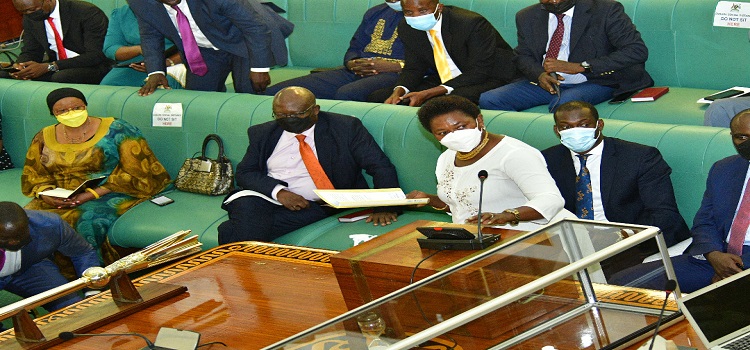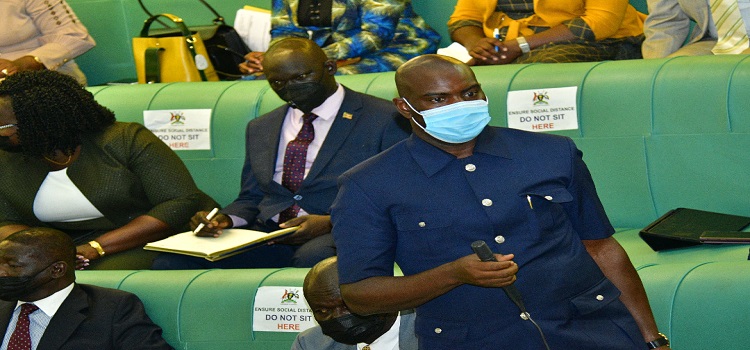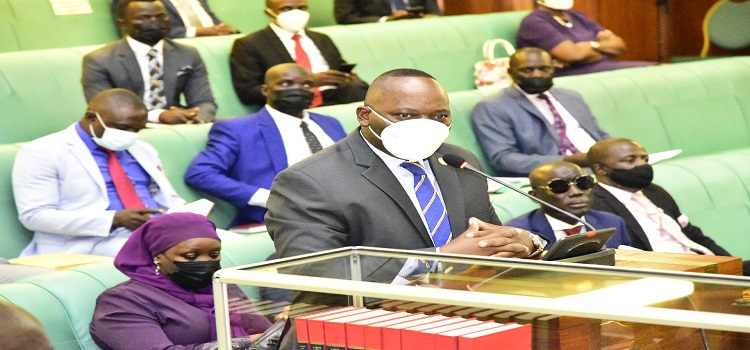MPs reject statement on skyrocketing commodity prices

Lawmakers have rejected a statement by Minister of State for Trade, Hon. Harriet Ntabazi on skyrocketing prices of essential commodities saying that it falls short of providing immediate interventions.
In her statement during plenary sitting on 11 April 2022, Ntabazi said that to address the escalating prices of laundry bar soap, cooking oil and sugar, government plans to expand the production of crude palm oil in Buvuma, Kalangala, Bundibugyo, greater Masaka and other areas.
“One of the drivers of commodity prices is the increased demand for palm oil, driven by growing importation by China and India who are the biggest buyers of crude oil,” she said.
She said this is worsened by the increase of import duty on crude palm oil, a raw material for production of the commodities.
“This increased the factory prices by six per cent for palm oil and 38 per cent for soap. Indonesia has imposed export limit for palm oil product of 20 per cent for domestic markets, leaving 80 per cent only for export markets, and that is where we were getting raw material,” she added.
She added that Malaysian crude palm oil production is low due to shortage of labour arising from the Covid-19 aftermath.
“With this thorough diagnosis, we are confident that we will have the right prescriptions to immediately stem the situation as government,” she said adding that, “we note that the increases registered in the few commodities gives us confidence that even those whose prices have started to rise, we will drive them down’.
She said that in case of unfair prices, the Petroleum Supply Act, 2003 mandates the Minister of Energy to intervene.
“But compared to our neighbors in Kenya, a litre of fuel has gone up to Shs6,800 while in Tanzania it is at Shs6,000 and Uganda it is at Shs5,000,” she said.
She blamed the skyrocketing commodity prices on the Ukraine-Russia war which she said has created a shortage of supply of inputs more especially raw materials of some of the goods produced in Uganda.
The Speaker, Anita Among however, demanded that the minister provides immediate, mid-term and long-term solutions.
“We have agreed that all countries have the same problem but we need to know the specific cause of skyrocketing prices in Uganda. We need remedial action government is taking to reduce prices of essential goods and how you want Parliament to help,” Among said.
She also urged the Minister not to compare Uganda with Kenya and Tanzania, saying that the cost of living in Uganda is different from that of the neighbouring countries.
“It is our responsibility to know, explain and get a solution for our constituents. I know we are in a liberalized economy where forces of demand and supply determine the prices but if we had a consumer protection law, our people would not be exploited,” she said.
Among added that while the legislators agreed that the Minister of Energy takes action against fuel stations whose pump prices have remained high, nothing has been done.
“We agreed on the issuance of warning letters, closure of some petrol stations but our people are still being exploited,” she said.
She tasked the Prime Minister to present a comprehensive report with immediate solutions is provided.
“The House has told you what we want. This is for the good of the country, nothing political. We want prices reduced and the whole world is waiting. Let us have a better discussion on Thursday,” said Among.
Hon. Nathan Byanyima (NRM, Bukanga North County) said that the neighbouring countries have reduced taxes on fuel as a way of addressing escalating prices of commodities.
“Let us set priorities within priorities. Members of the cabinet should sit and see what to do for our people. This is the right time since we are budgeting. Let us sit and see what we can do during this financial year and ensure that we are aiming to reduce commodity prices” he said.
Kampala Central Division MP, Hon. Muhammad Nsereko asked government to explore the option of cutting taxes on the essential commodities.
“As an August House, what solutions to do we have? Do we reduce taxes so that we reduce the cost of manufacturing of soap without necessarily injuring the growth of our local players?” Nsereko asked adding that, ’in the short run, do we think there are those that can provide soap at a lower price? What do you do as ministry of trade or finance? Open up, suspend the tax or wave it?’

Sheema Municipality MP, Hon. Dickson Kateshumbwa said the Minister should have first researched on the escalating prices of essential commodities in the East African region, to provide appropriate interventions.
“The cooking oil price in Kenya has increased by 33 per cent, in Tanzania, 39 per cent but in Uganda, by 73 per cent. What is the reason? Is it because of the excise duty we have on palm oil? The Ministry should have looked at the factors from importation, taxation to local trade practices and come up with a comprehensive statement that can give us assurance; the statement does not give us assurance,” he said.

The Leader of the Opposition, Hon. Mathias Mpuuga said that the minister’s statement was not clear on government’s commitment on addressing the skyrocketing prices.
“It seriously falls short of expectations. I would like to invite the minister to be courageous. We need to address this matter without hiding anything then we shall find a solution,” said Mpuuga.
He added that the minister should have addressed the House on how the government plans to address the issue of petroleum marking at the Mombasa border point.
“Fuel marking adds Shs30 per liter on imported petroleum; this money is not government revenue. We are the only country in the world that charges citizens money for marking petroleum. We are granting private people money and asking citizens to pay,” said Mpuuga.
